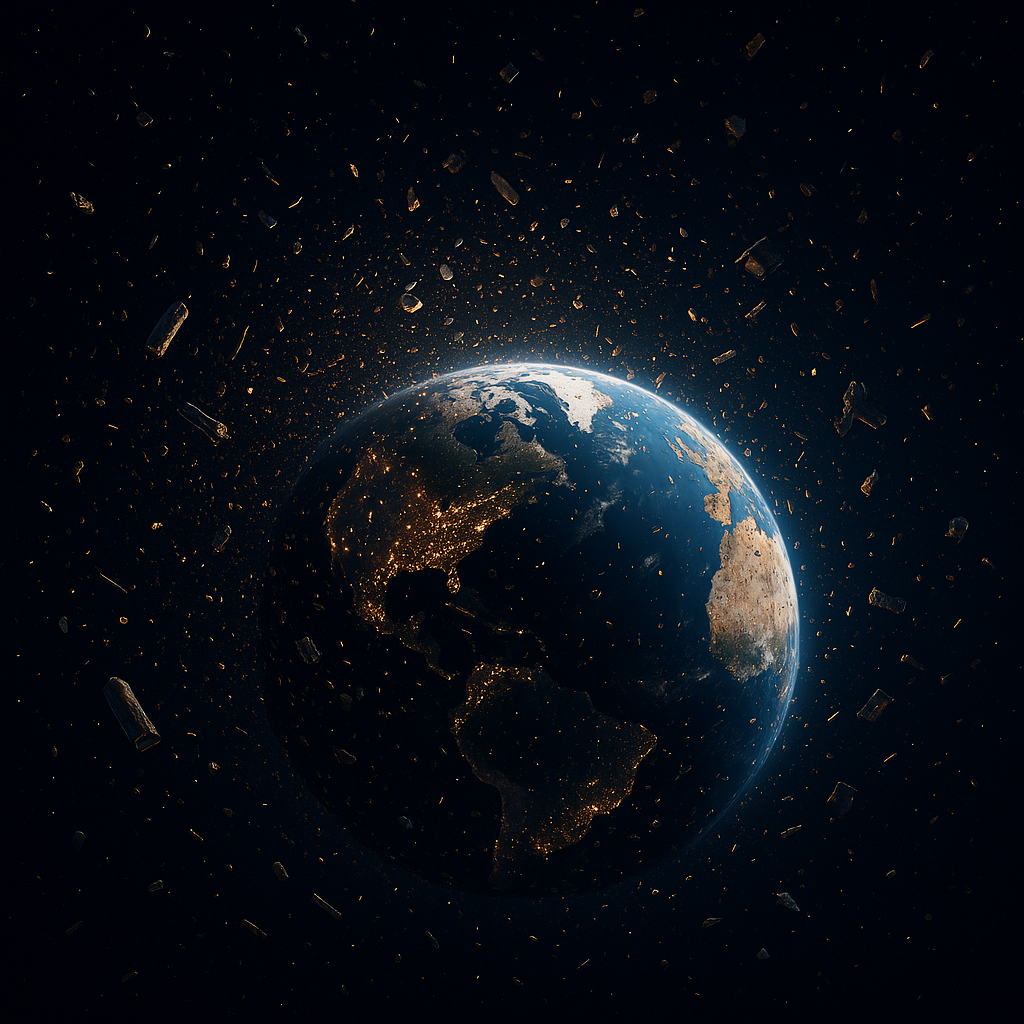
Introduction
At first glance, the night sky appears calm and silent. But far above us, a growing crisis is unfolding — Earth’s orbit is becoming a cluttered graveyard of defunct satellites, rocket fragments, and metallic scraps. A 2024 report by the European Space Agency (ESA) delivers a dire warning: we’re rapidly approaching a tipping point where the sheer volume of junk could render orbital space unusable. This makes space debris cleanup more than a necessity — it’s a global emergency.
🚀 Understanding the Threat: Why Space Debris Cleanup Can’t Wait
Low Earth Orbit (LEO), the most heavily trafficked region in space, is now teeming with over 1.2 million debris objects larger than 1 cm. These objects — traveling at hypersonic speeds — can cause catastrophic damage to satellites, spacecraft, or even the International Space Station (ISS). In 2024 alone, more than 1,200 intact objects, including rocket stages and dead satellites, re-entered Earth’s atmosphere — averaging over three uncontrolled descents per day.
This mess isn’t just inconvenient. It’s dangerous. And without a dedicated space debris cleanup strategy, the problem will only worsen.
🌐 The Kessler Syndrome: A Chain Reaction We Can’t Ignore
A major concern tied to this growing orbital clutter is the Kessler Syndrome — a theory by NASA scientist Donald J. Kessler, which predicts a self-sustaining chain reaction of collisions in orbit. As debris hits other debris, it breaks into even more pieces, multiplying the threat geometrically. ESA’s data shows that we’re inching closer to this scenario.
Even if all space launches stopped today, these fragments would continue colliding, accelerating a crisis that could cripple communications, space missions, and global infrastructure. That’s why space debris cleanup is not just a technical task — it’s a survival imperative.
🌍 Real-Life Consequences Proving the Urgency for Space Debris Cleanup
The threat is no longer abstract. In December, debris from a 500-kg rocket fell into Mukuku village in Kenya, confirmed by the nation’s space agency. Months earlier, a large piece of a SpaceX Falcon 9 rocket landed in a man’s yard in the U.S. While both incidents were non-lethal, they illustrate a worrying trend: space debris is returning to Earth in unpredictable, potentially dangerous ways.
These close calls reinforce the need for proactive space debris cleanup before the next incident causes serious harm.
📡 Satellite Booms and Orbital Chaos: The Root of the Crisis
A key contributor to the mess in orbit is the rapid rise of commercial satellite constellations. Companies like SpaceX (Starlink), Amazon (Project Kuiper), and OneWeb are launching thousands of satellites to deliver global broadband. While revolutionary, this rush to space is adding massive amounts of hardware to an already overburdened orbital zone.
Add in rising solar activity, which can weaken satellite orbits and cause unpredictable re-entries, and it becomes clear: without space debris cleanup, we’re playing a dangerous game in the skies above us.
The Future of Space Depends on Active Space Debris Cleanup

Experts are unanimous: space debris cleanup is no longer optional — it’s essential. As of now, there’s no formal global infrastructure to clean up this mess. But several promising missions and technologies are emerging, including:
- 🛰 ESA’s ClearSpace-1: A mission to deorbit a defunct satellite, scheduled for launch in 2026.
- 🧲 Astroscale’s satellite grabbers: Designed to dock with, stabilize, and deorbit dead satellites.
- 🔗 Harpoon and net-based debris catchers
- 🔥 Laser-based debris vaporization systems
Despite these innovations, international cooperation is limited. Space debris belongs to no one, yet its consequences affect everyone. The only solution is a globally enforced space debris cleanup framework, with fines, regulations, and mandatory deorbiting protocols.
What Happens If We Don’t Act on Space Debris Cleanup?
The cost of inaction is too high to ignore. Here’s what’s on the line:
- 🌐 Global Communications: GPS, internet, broadcasting, and emergency systems rely on orbital infrastructure.
- 🛰 Space Missions: Future explorations, including Moon and Mars programs, could be grounded due to launch risks.
- 🔭 Scientific Research: Instruments like Hubble or the ISS may need early retirement due to collision threats.
- 🛡 National Defense: Surveillance and satellite-based operations could suffer permanent loss.
Without an effective space debris cleanup roadmap, we risk losing access to the very skies we rely on.
🤝 Space Debris Cleanup: A Shared Global Responsibility
Space is the next frontier — and we’re already ruining it. We’ve polluted our oceans, atmosphere, and now the vacuum of space is becoming our next casualty. But it’s not too late.
Every country that launches satellites has a role in space debris cleanup. Whether through government funding, private-public partnerships, or international treaties, action is needed on all fronts.
The longer we wait, the harder the job becomes.
✅ Key Takeaways on Space Debris Cleanup
- 🌌 1.2 million+ objects over 1 cm wide threaten satellites and space stations.
- 💥 Kessler Syndrome poses a real risk of unstoppable collision chains.
- 🛰 Uncontrolled re-entries are already happening — and increasing.
- 🧹 Active space debris cleanup missions are emerging but need support.
- 🤝 Global cooperation and regulation are vital for orbital safety.
hentaifox I like the efforts you have put in this, regards for all the great content.